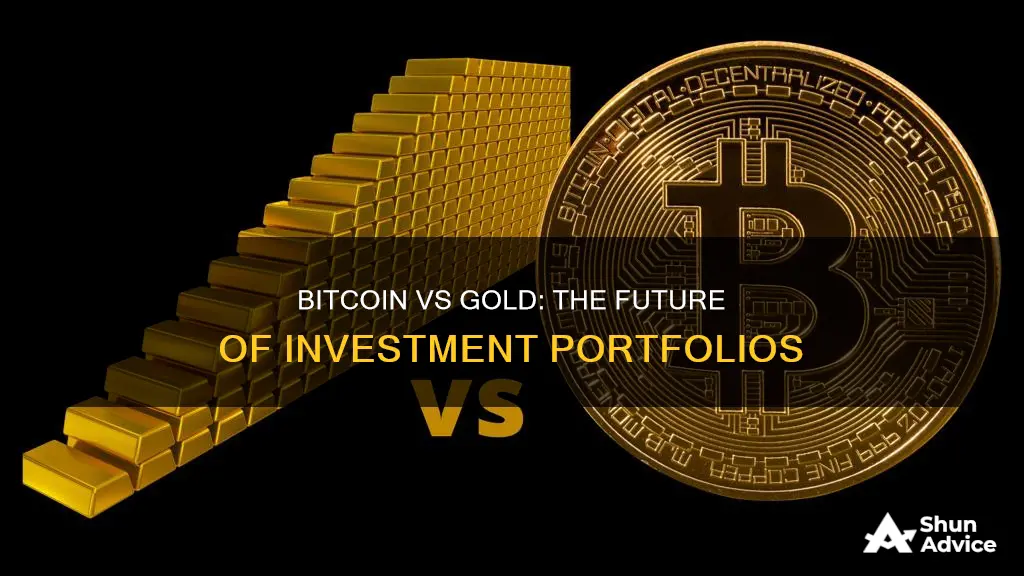
Bitcoin and gold are both seen as safe-haven assets, but can the former replace the latter in an investment portfolio?
Bitcoin is a decentralised, digital currency that was launched in 2009. It has no physical form and is not controlled by any organisation or government. Bitcoin is mined by using computers to solve complex mathematical problems. The first computer to solve the problem is rewarded with new bitcoins.
Gold, on the other hand, has been used as a medium of exchange for thousands of years and is seen as a stable investment. However, its performance has been relatively lacklustre since the 1970s.
Both assets are scarce, which helps to conserve their value. But while the supply of gold is dependent on mining activities and new discoveries, there is a finite number of bitcoins that will ever enter circulation – 21 million.
Bitcoin has been described as digital gold and has been rapidly winning market share from gold. If you invested £100 in gold at the start of 2020, you would have about £120 now. A £100 investment in Bitcoin would have turned into about £415.
However, bitcoin's price is far more volatile than gold. While this volatility can deliver huge gains, it can also result in significant losses.
So, can bitcoin replace gold in an investment portfolio? It depends on your risk tolerance, investing goals, strategy, and the amount of capital you can handle losing.
| Characteristics | Values | |
|---|---|---|
| --- | --- | --- |
| Age | Gold is thousands of years old; Bitcoin was launched in 2009 | |
| Volatility | Gold is stable; Bitcoin is highly volatile | |
| Returns | Gold has a low annual return; Bitcoin has a high annual return | |
| Liquidity | Gold is more liquid; Bitcoin is less liquid | |
| Accessibility | Gold is harder to access; Bitcoin is easier to access | |
| Regulation | Gold is highly regulated; Bitcoin is less regulated | |
| Use cases | Gold has more use cases; Bitcoin is limited to financial services | |
| Investment anonymity | Gold is pseudonymous; Bitcoin is not anonymous | |
| Investment type | Gold is a safe haven asset; Bitcoin is a speculative asset | |
| Finite supply | Gold has a presumed finite supply; Bitcoin has a set finite supply | |
| Decentralization | Gold is centralized; Bitcoin is decentralized |
What You'll Learn

Bitcoin's finite supply
Bitcoin has a finite supply of 21 million coins. This is a core feature of the cryptocurrency, designed by its anonymous creator(s) Satoshi Nakamoto, to limit the supply and increase its scarcity over time. This is intended to increase demand and price.
Bitcoin inventor Nakamoto coded the cryptocurrency with a cap to limit the supply. The maximum total supply of Bitcoin is 21 million. This is in contrast to currencies supplied by central governments, which do not have a hard limit, and can be printed at will.
The total number of bitcoins issued is not expected to reach 21 million due to the use of rounding operators in the Bitcoin codebase. No additional bitcoins will be generated when the Bitcoin supply reaches its upper limit.
As of December 18, 2023, there were 19.57 million bitcoins in existence, with 1.42 million left to be rewarded.
The finite supply of Bitcoin has driven up its value. The rarer an item is, the higher its value. As of 2024, the value of Bitcoins has grown a million-fold over a decade.
Bitcoin is similar to gold in that it has a finite supply, and must be mined. However, Bitcoin is mined through computational means, rather than being physically dug out of the earth. Bitcoin mining requires the solving of highly complex mathematical equations.
The finite supply of Bitcoin has led to speculation about its future. Some sources suggest that it is unlikely that all investors will replace gold with Bitcoin in their strategies. Instead, each will have a place in a portfolio based on preferences and risk tolerance.
Strategizing Bitcoin Investments: Maximizing Returns
You may want to see also

Gold's finite supply
Gold is a finite resource, and there will eventually be none left to mine. While it is difficult to quantify the exact amount of gold left to mine, estimates suggest that there is about 20% still to be mined.
Gold is in hot demand as an investment, a status symbol, and a key component in many electronic products. It is also used in dentistry, electronics, and luxury items. Gold is easy to shape and can be divided into near-perfect uniform chunks that remain stable for centuries or millennia. Its unique physical properties make it difficult to counterfeit.
The finite nature of gold makes it a reliable investment option. Its value is likely to increase as it becomes scarcer. However, the price of gold is also influenced by other factors, such as market trends and economic conditions.
While Bitcoin has been proposed as a possible replacement for gold in investment portfolios, it is important to note that Bitcoin is a relatively new and unproven investment option compared to gold. Bitcoin's value is highly volatile and subject to media effects, investor sentiment, regulatory actions, and hype.
In summary, gold's finite supply contributes to its value as an investment option. However, other factors also influence gold's price, and it is important to consider these factors when making investment decisions.
Cboe Bitcoin Futures: A Smart Investment Strategy
You may want to see also

Bitcoin's volatility
Bitcoin is a young and unproven investment vehicle, but it has been used successfully to store value and hedge against corrections and recessions. However, it is highly volatile.
Bitcoin's value has fluctuated wildly since its launch in 2009. In 2010, early speculators discovered the Bitcoins they had previously purchased for fractions of a cent had grown to $0.09 per Bitcoin. By April 2021, Bitcoin's price hit about $61,000 and peaked in November at $69,000. After a long period of much lower prices, its price skyrocketed to more than $75,000 in March 2024.
Bitcoin Investment: Keep or Quit?
You may want to see also

Gold's volatility
Gold is a volatile investment, and its price can be affected by a number of factors, including:
- Market trends and macroeconomic indicators
- Inflation and deflation
- Currency exchange rate movements
- Returns on equity markets
- Oil prices
- Political events, such as wars, national elections, and changes in government policies
- The price of other commodities
- The supply of gold
- Investor sentiment
Gold's price volatility can be advantageous during times of economic uncertainty, such as high inflation and geopolitical tensions. In these situations, gold is seen as a safe haven asset, and its price tends to rise. However, gold's price can also drop significantly, making it a risky investment.
Gold's price volatility is also influenced by its history as a store of value and its limited supply. Gold has been used as a form of currency for much of human history, and its value has been preserved over thousands of years. Additionally, gold has a finite supply, as it is a precious metal that is mined from the Earth's crust. These factors contribute to gold's reputation as a stable investment and a hedge against market downturns.
A Beginner's Guide to Investing in Bitcoin in India
You may want to see also

Bitcoin's investment proposition
Bitcoin is an exciting new financial product that may be useful for inclusion in investment portfolios. It has been around long enough to gain recognition and support and is being used in ways that appear to demonstrate a few trends.
Additionally, Bitcoin has a finite supply of 21 million coins, which is written into its blockchain code. This is in contrast to gold, where the supply can be influenced by mining activities and new discoveries. Bitcoin's decentralised nature also ensures that it is secured behind an impenetrable network, which no single person or entity can devalue or confiscate.
However, it is important to note that Bitcoin is a young and unproven investment, with high volatility and regulatory uncertainty. Its value is subject to media effects, investor sentiment, and hype, and it has yet to be seen how it will perform during a market crash or economic recession.
Therefore, while Bitcoin has the potential to be a good investment, its high risk and speculative nature means that it should only constitute a small portion of an investor's portfolio.
Doge Coin: Worth the Investment Risk?
You may want to see also
Frequently asked questions
Gold has been used as a store of value for millennia, and is a stable investment that performs well during market corrections. It's also difficult to counterfeit, and its value is not influenced by governments or central banks.
Bitcoin is a decentralised, digital currency that is not controlled by any government or central bank. It's also finite, with a set limit of 21 million coins, and its value is not influenced by mining activities or new discoveries.
Gold's value is volatile and it has underperformed in recent years, failing to keep pace with inflation since the 1970s. Bitcoin is also volatile, and its value has fluctuated wildly over the past few years. It's also a relatively new asset, so there is a risk that it could become useless and invaluable.







